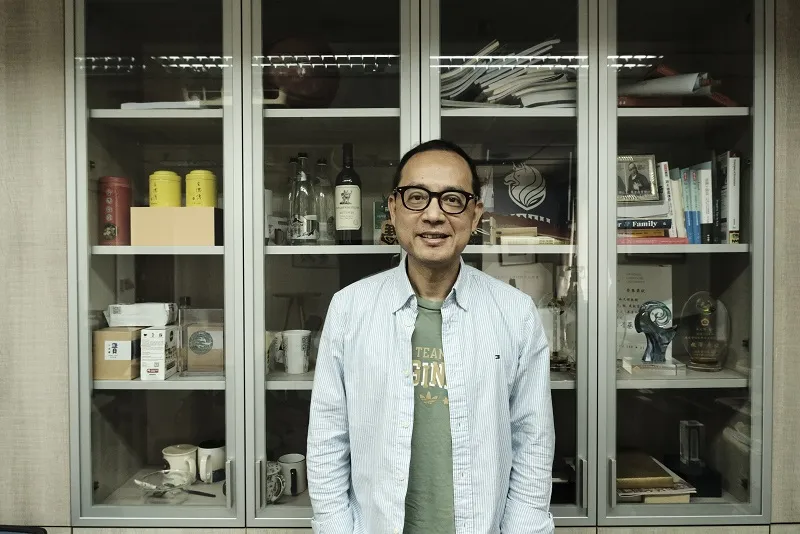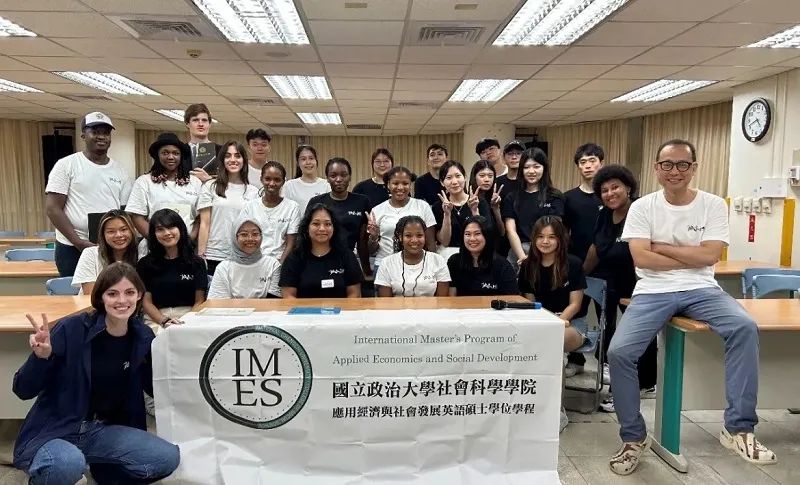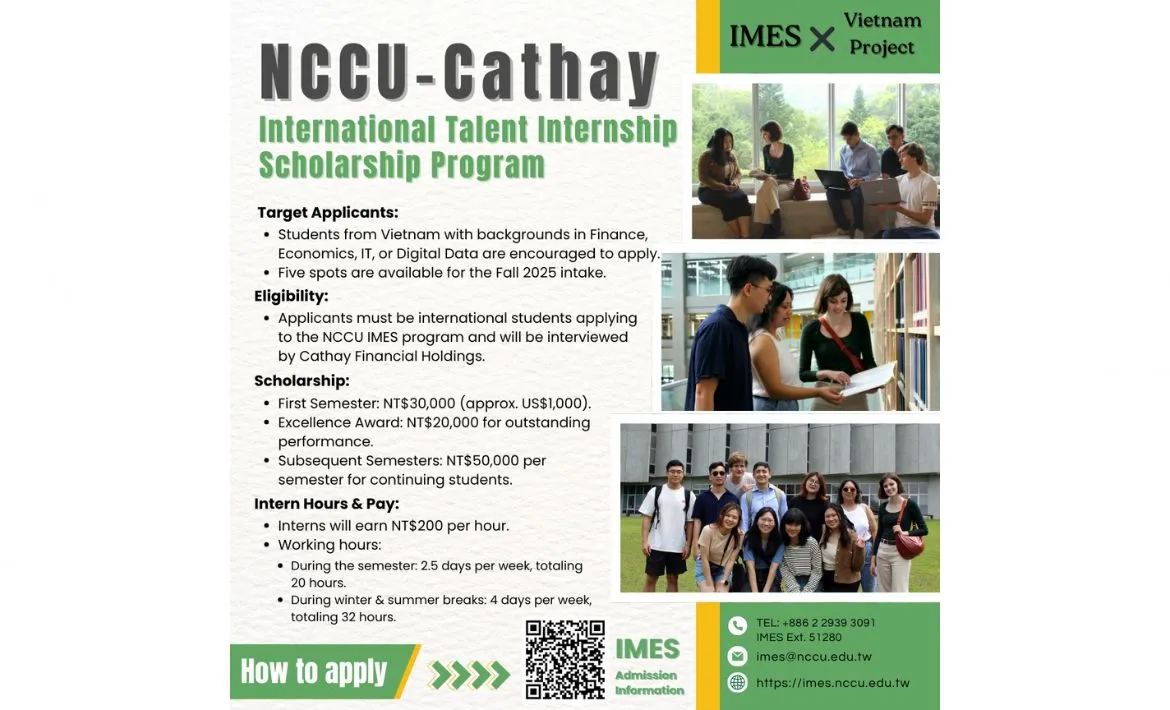From a childhood dream of teaching to leading one of NCCU's most globally focused graduate programs, Professor Jack Wen-Chieh Wu's journey exemplifies how far vision and dedication can take someone. On a Friday morning, in his sunlit office, he shares how his passion for education transformed into a mission to connect Taiwan's classrooms with the world.
Dreams, Discoveries, and Dedication
Ever since a young age, Professor Wu dreamed of becoming a teacher, though he never imagined he would one day earn a PhD and become a university professor. It wasn’t until his undergraduate years that the idea truly took shape. During that time, he encountered several young professors returning from abroad whose presence left a lasting impression. “They had a very different aura,” he recalled with a smile. “They seemed to teach a few classes and often traveled abroad during summer and winter breaks.” The lifestyle and intellectual environment they embodied inspired him to pursue an academic career.
Although later, he discovered that professor life wasn't as easy or relaxed as he had once believed, Professor Wu still completed his doctorate and began teaching at a prestigious liberal arts college in the U.S. Eventually, family responsibilities led him back to be a scholar and an educator in Taiwan. By chance, a position opened at National Chengchi University his alma mater, where he had studied economics and he eagerly seized the opportunity to return and give back to the institution that had shaped his academic journey.
The Teacher Who Keeps Learning
Returning to NCCU as a faculty member marked the beginning of a new chapter for Professor Wu, during which he would teach and continuously refine his approach to education. He credited his teaching success and recognition, including the prestigious 2023 Chun-Ni Outstanding Award (112年仲尼傑出教學獎), to his ability to adapt to the evolving needs of his students. Teaching is a challenging job, he reflected. You're constantly engaging with new generations, each with unique characteristics, strengths, and expectations. He recognized that effective instruction cannot rely solely on past methods and emphasized staying current. I must keep learning and stay informed about current issues to bring relevant insights into the classroom, he stated.
Professor Wu also highlighted the importance of understanding the perspectives of today’s students, particularly the so-called “E-generation,” who are accustomed to digital learning environments. He noted that integrating e-learning tools and digital platforms is essential for effectively reaching them. “To be a good teacher, you must continually reflect on what students today need and how to teach in ways that resonate with their learning styles.” His commitment to lifelong learning and pedagogical flexibility has remained at the core of his teaching philosophy.
Research That Matters: Housing, Policy, and Society
Professor Wu has dedicated much of his academic research to housing-related issues, with a particular focus on property taxation and rental policies. A key motivation for his work is the persistently high housing prices in Taiwan. “I have always researched aspects of housing prices and their effects,” he explained. His studies also explore broader social implications of housing, such as how improved living environments can impact children's educational outcomes. For instance, one of his studies investigated whether better housing conditions contribute to stronger academic performance. This interdisciplinary approach connects housing policy to larger societal concerns.
Additionally, Professor Wu has examined the ongoing issue of illegal construction in Taiwan, which presents a significant challenge. Notably, even unauthorized structures are subject to taxation, adding complexity to his research on property-related tax policies.
When asked if these topics are relevant to international students, Professor Wu noted that while some issues are specific to Taiwan, many have global significance. “Housing prices and illegal constructions are not unique to Taiwan; they exist in many parts of the world,” he said. In his classroom, he tends to focus on current events—such as recent discussions on overall tariffs or the appreciation of the Taiwanese dollar—which he regularly shares with his students.

Picture: Professor Jack Wen-Chieh Wu in his sunlit office shared how far vision and dedication can take someone.
Teaching Across Languages and Cultures
Professor Wu shared his experience teaching both in Chinese and English, noting that the main difference lies in the subject matter rather than the teaching methods. "The topics of my English and Chinese courses are quite different, so that’s a significant distinction," he explained. Professor Wu shared his experience teaching in Chinese and English, highlighting that the primary difference lies not in his teaching methodology but in the subject matter he covers. He explained, “The topics I teach in English and Chinese are quite different, so that’s where the main distinction lies. However, my teaching approach remains the same.” Having taught abroad, he views teaching in English primarily as a matter of language adaptation rather than a fundamental shift in practice. Nevertheless, he acknowledged that translating specific technical terms or concepts from English to Chinese can be challenging and requires careful interpretation.
Even though there is one primary language for each of his classes, Professor Wu noted that his courses often include Taiwanese and international students. “When I taught in the U.S., my classrooms were naturally diverse, so having a mix of local and international students feels very normal,” he explained. However, beside the importance of being mindful of cultural sensitivities, he recognizes that students may have varying expectations and academic habits due to different educational systems. In response, he designs diverse evaluation methods to ensure fairness. “I try to avoid a one-size-fits-all standard,” he stated. “Instead, I assess students through multiple criteria, acknowledging that they may demonstrate their strengths differently.” While these adjustments are made with care, Professor Wu emphasized that his teaching philosophy remains consistent, guided by respect for diverse learning styles and a commitment to equitable education.
According to Professor Wu, one of the most significant differences between Taiwanese and international students is their problem-solving and thinking approaches. "Taiwanese students are often trained from a young age to focus on finding a standard answer. They excel in multiple-choice questions, where they can identify the best option," he said. In contrast, international students are typically used to thinking more analytically, which may lead them to struggle with multiple-choice questions as they tend to consider a broader range of possibilities. However, international students excel in situations without clear, standard answers, requiring them to express their ideas or engage in deeper analysis.
The Making of IMES: Vision, Struggles, and Growth
Professor Wu reflected on his journey as the director of the IMES (International Master's Program of Applied Economics and Social Development), a program he had been instrumental in creating from the very beginning. The idea for the program first emerged when he and the former dean of the College of Social Sciences at NCCU envisioned establishing an English-language master's degree in applied economics, inspired by his experiences at the University of Michigan. What began as a simple proposal soon evolved into a cross-disciplinary program that integrated applied economics with social development, now known as IMES.
Initially, Professor Wu hesitated to take on the director role due to his aversion to administrative responsibilities. However, as the program faced challenges, including limited visibility and difficulties in recruitment, the dean encouraged him to step into the leadership position. "It felt like nurturing a baby that I had helped bring into existence," he said. "I wanted to see it grow and succeed." This deep sense of responsibility ultimately motivated him to accept the role and invest his time and energy into its success.
One of Professor Wu's most significant challenges was defining and shaping the program's unique identity. He devoted countless hours to curriculum development, ensuring it met both academic standards and the needs of international students. He also worked tirelessly to build connections and raise the program's profile, even managing the program's social media presence himself. "I used social media extensively to promote the program," he recalled, recognizing the power of modern platforms to engage a global audience.
Despite the many challenges, Professor Wu's most rewarding aspect was seeing the students who graduated from IMES passionate about the program and its mission. "That, for me, was the greatest reward," he reflected, proud of the program's growth and its success in shaping the future of applied economics and social development.

IMES provides a unique cross-disciplinary approach that combines applied economics with social development. Photo by IMES。
What Makes IMES Unique?
The core of the International Master’s Program of Applied Economics and Social Development (IMES) is its distinctive interdisciplinary approach, which integrates applied economics with social development. This makes it one of the few programs in the world that aligns with the demands of our rapidly changing environment. Industry experts, such as the Sustainable Development Manager at KPMG Taiwan, emphasize that this combination is increasingly essential for addressing global challenges.
The IMES curriculum addresses today’s most pressing topics: AI, big data, fintech, sustainability, social innovation, and the semiconductor industry. Students learn about and explore these trends through an interdisciplinary perspective, equipping them to connect theoretical knowledge with real-world applications.
IMES also provides opportunities for international careers through various global learning pathways. Dual-degree options, such as those partnered with the University of Illinois at Chicago, enable students to earn two master’s degrees in two years—one from Taiwan and one from the U.S.—while paying local tuition rates.
In addition, the Program boasts a diverse classroom environment that complements its international perspective. With two-thirds of the students coming from overseas and one-third local, IMES creates a vibrant, multilingual atmosphere where cultural exchange is integral to daily learning. “We believe it’s the best way to combine local and foreign students.Taiwanese students expand their global perspectives, while international students gain valuable insights into Taiwan’s dynamic society. “
Outside of the classroom, IMES has strong connections with leading corporations, such as Cathay United Bank, which offer internships and scholarships, particularly for students from Vietnam. These practical experiences often lead to job offers upon graduation, helping students build careers as globally competent and socially conscious professionals.
“At IMES, we bring together exceptional faculty members from across NCCU. Each contributes deep expertise in their respective fields, helping us provide students with a strong interdisciplinary foundation and a broad academic outlook.” said professor Wu.
Picture: Poster of 2025 NCCU-Cathay International Talent Scholarship Program
Looking Ahead: IMES and the Global Future
Looking ahead, the goal for IMES is to have an impact that goes beyond Taiwan. “We really hope that this program can extend its influence to other countries as well,” Professor Wu shared. “We want to raise the visibility of IMES, not just within Taiwan, but across the Asia-Pacific region and eventually on a global scale.”
To support this, IMES launched an International Symposium on Applied Economics last year, which is now held annually. The symposium invites eight emerging scholars from the Asia-Pacific region—including Japan, Korea, and Southeast Asia—to come together, share research, and engage in academic exchange. “This kind of gathering allows these young scholars to get to know our program and build connections with us,” he explained. “The feedback has been really positive. Many of them returned to their home countries with a great impression of the symposium and our program, which helps spread awareness of IMES internationally.”
Professor Wu emphasized that this is just one part of a broader effort to internationalize the program. “We’re also bringing in more international scholars to teach, both for short-term courses and longer appointments. Their participation adds new perspectives and enriches the learning experience for our students.”
In addition to academic exchange, IMES is also actively building partnerships with the corporate sector. “As Taiwanese companies look to expand globally, they need talent with international experience. And that’s exactly the kind of talent we’re cultivating here,” Professor Wu said. “Our program can help connect international students with opportunities in Taiwan’s industries, while also supporting local companies in their global outreach. It’s a win-win for everyone.”
Words of Wisdom: Professor Wu’s Advice to Students
Professor Wu believes that two of the most essential skills for today’s university students are interdisciplinary competence and international mobility. “Students today need to develop interdisciplinary abilities because society has evolved to demand greater flexibility and a broader knowledge base—not just deep expertise in a single field,” he explained. He also underscored the growing importance of international mobility in a rapidly globalizing world. “This generation is no longer bound by geography; global movement is constant, and the ability to navigate across borders is crucial.”
Professor Wu noted that universities are increasingly adapting curricula to cultivate these skills. For instance, at National Chengchi University (NCCU), more elective courses outside students’ primary disciplines are offered, promoting interdisciplinary exploration. “Many NCCU students are now pursuing double majors or minors, which supports cross-disciplinary education. It’s a positive trend,” he remarked. Additionally, with a growing number of courses taught in both Chinese and English, along with the presence of international exchange students, local students are gaining more opportunities to engage with diverse cultures. These experiences, he stated, help expand students’ global outlook and prepare them to thrive in international settings.
“Don’t let yourself be constrained by existing frameworks,” Professor Wu advises. He urges students not to follow the crowd simply because it appears to be the safest path. Instead, he encourages them to be bold, try new things, and stay true to themselves. He also emphasizes the importance of broadening one’s perspective, especially by studying or traveling abroad to gain firsthand insights into other cultures and ways of thinking.